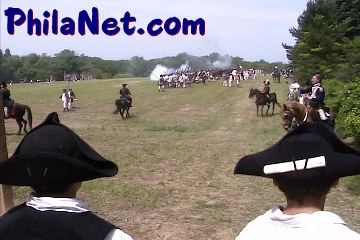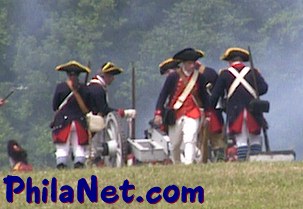
by
John Johnstone

Real Player
Streaming Video or
Download
Battlefield
in Intel Video Interactive AVI
You can click here to view
a roster of local recruits.
David Jones, the fighting parson of the Revolution once said; "No one could
live on the Ridge from boyhood without becoming a sound American, because the
Battle of Germantown and the March to Valley Forge would be sure to become
part of his every being."
Roxborough Township in 1776 had a population of over 600 and 30 houses were
along the Ridge Road. Only a few remain to tell their tale. The current
Manayunk had not been thought of and was basically the wooded cliff-side of
the Roxborough plantations, bordering the Schuylkill River. There were only
two houses owned by the Levering Family (since demolished) in current
Manayunk, along with two fisheries and "Righter's Ferry" crossing the
Schuylkill into Bala Cynwyd.
90 Roxborough men, young and old, are documented as early Continental
soldiers with many others joining as the War progressed. On October 3, 1775,
Colonel Henry Hill wrote; "We have got around about Roxborough an active and
well-disciplined company". A Mr. Paine who had once been in the British Army
drilled the recruits. In 1777, Aaron Levering became Lieutenant Colonel of
the 2nd Battalion of Philadelphia Associators for Germantown, Roxborough,
Springfield and Bristol Townships.
On a journey from Philadelphia to Reading, George Washington noted the
"sturdiness" of the stone farmhouses along Ridge Road and how they become
"red" West of Norristown. That still falls true as the Roxborough houses are
built with a gray "Wissahickon Schist" and the houses west of Norristown are
built with a red fieldstone. George Washington stayed at Colonel Henry Hill's
house on August 4th through 8th of 1777 and returned to Roxborough on several
occasions. He brought 11,000 soldiers with him to Roxborough following the
Battle of Brandywine. Many Continental soldiers from several states were in
the area that summer and fall, arriving poorly clad and many barefoot.
On September 25th, 1777, the British Army, in full red uniform marched toward
Philadelphia down Ridge Road from Phoenixville (many marched down Germantown
Avenue as well). Mary Levering, then 17 recalled; "First came three
horsemen-the most splendid looking men-on noble prancing steed. Then followed
artillery and light horse. At first they came along in intervals, but soon
the road was crowded and thus they went nearly all day." The British camped
in Germantown and there were a few skirmishes in Roxborough with no
fatalities until the Battle of Germantown, which occurred on October 4th,
when many American lives were lost. The British
had occupied Philadelphia at the time
of
the battle.
A cold winter started in November. The 15,000 soldiers in the area who
marched to Valley Forge had little on their feet and were poorly clothed from
the British taking supplies. Blood marked the snow on Ridge Road where they
had walked.
On December 19th, 18 Virginia Patriots seeking a place to sleep were put up
in a barn belonging to the Wood Family at Ridge and Roxborough Avenues. Upon
Morning, some British Dragoons discovered the soldiers, slaughtered them and
set the barn on fire. In Roxborough Baptist Church Graveyard, a memorial
monument remains in memory of those Virginia Patriots.
Another significant mark in Roxborough history, is when the British sought
General Lafayette for capture. It was
May 19, 1778. Lafayette brought with him 50 Native American
Scouts to Ridge and Port Royal Avenues. General Gray marched up Ridge Road
with about 50 Dragoons (Red Coats). The Natives were said to have scared off
the Redcoats who then marched back to Philadelphia.
Many buildings remain in Roxborough that had either housed Continental
soldiers or were built after the War by those who survived the battles of the
Revolution and prospered. One should note when researching Roxborough during
the Revolution; George Washington spelled Roxborough, "Roxboro".
Moving Picture Show
Following are videos of the Revolutionary War re-enactment
held in Whitpain Township, Pennsylvania. They are made
available in a variety of file formats. For more help
with multimedia, please
click here.
and reenactment photos by KingArthur.com
Still Pictures
by John Johnstone
Virginia Patriots Memorial
Captain Aaron Levering House
Captain Joseph Starne House
Captain David Jones House
Milestone To Philadelphia
The 1700's
 Roxborough During the Revolution
Roxborough During the Revolution
